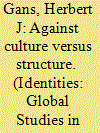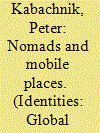|
|
|
Sort Order |
|
|
|
Items / Page
|
|
|
|
|
|
|
| Srl | Item |
| 1 |
ID:
113867


|
|
|
|
|
| Publication |
2012.
|
| Summary/Abstract |
Contemporary sociology is saddled with a culture-structure binary but the fault for its existence lies mostly with cultural sociology. This article is devoted to four related assertions: (1) There has never been any agreement on the definition of culture, making cultural sociology a field unable to define its central concept. (2) The binary ignores the fact that the proper explanation of social behaviour requires both structure and culture; culture cannot be its own cause. (3) Cultural sociology is soft and sentimental, avoiding conflict as well as politics. (4) It neglects policy and policy-relevant research even more than the rest of sociology. Structural sociology has some shortcomings as well, however, and the culture-structure binary should be abandoned.
|
|
|
|
|
|
|
|
|
|
|
|
|
|
|
|
| 2 |
ID:
113868


|
|
|
|
|
| Publication |
2012.
|
| Summary/Abstract |
This article explores the socio-economic significance of patronage at the edge of the Indonesian state. It argues that marginal borders and adjacent borderlands where state institutions are often weak, and state power continuously waxes and wanes, encourage the growth of non-state forms of authority based on long-standing patron-client relationships. These complex interdependencies become especially potent because of traditionally rooted patterns of respect, charismatic leadership and a heightened sense of autonomy among borderland populations. The article contends that an examination of these informal arrangements is imperative for understanding the rationale behind border people's often fluid loyalties and illicit cross-border practices, strained relationships with their nation states and divergent views of legality and illegality. The article contributes to recent anthropological studies of borders and believes that these studies could gain important insight by re-examining the concept of patronage as an analytical tool in uncovering circuits of licit and illicit exchange in borderlands.
|
|
|
|
|
|
|
|
|
|
|
|
|
|
|
|
| 3 |
ID:
113871


|
|
|
|
|
| Publication |
2012.
|
| Summary/Abstract |
Though there is a danger that 'place' may become subsumed or ignored in research as attention now shifts to questions of 'mobility,' discussion of place has burgeoned throughout academia. Many texts declare that place is important, or proclaim the power of place. While place has been shown to be a fundamental part of human existence, what does this then mean for those who are characterized as not being interested in places? Examining nomadic Gypsies and Travelers in Britain, who are often constructed as placeless, highlights that this is not simply a representational concern, but has a tangible empirical affect, impinging on their everyday practices as well as influencing policies and laws that actively deny them their right to place. By exploring various definitions of place and how this impacts the understanding of mobilities, I demonstrate that the meaning ascribed to nomads is dependent upon a spatialized definition of place which is underpinned by the space-place binary. It is this aspect of the discourse that allows for nomads to be constructed as out-of-place wherever they are, and by recognizing this we can avoid framing placelessness as a natural characteristic of nomadism. Reconceptualizing place allows for more nuanced understandings of nomadism, as our identities are constructed in relation to both place and mobility, not just one or the other.
|
|
|
|
|
|
|
|
|
|
|
|
|
|
|
|
| 4 |
ID:
113870


|
|
|
|
|
| Publication |
2012.
|
| Summary/Abstract |
How are different ethnic groups dealing with upward social mobility and assimilation? This is a large question that social research has tried to address in recent decades. In the United States, this issue has been framed by the theory of segmented assimilation. In Europe, regarding the Romà, the assumption still exists that upward mobility paths are intrinsically associated with a loss of ethnic identity, due to a process of full acculturation to the mainstream. In this article, through an analysis of 48 in-depth interviews with middle-class Romà in Spain, we identify other mobility paths, such as selective acculturation, that exist in addition to full acculturation. In this sense, we observe how symbolic differences exist between those middle-class Romà who live in an ethnic enclave and have a strong network of support and those who do not. In most cases, middle-class Romà tend to live outside the enclave and experience what we have called constricted ethnicity.
|
|
|
|
|
|
|
|
|
|
|
|
|
|
|
|
| 5 |
ID:
113872


|
|
|
|
|
| Publication |
2012.
|
| Summary/Abstract |
This article looks at young Rwandans of 'mixed' Hutu-Tutsi heritage, exploring how their mixed identity shaped their experiences during the 1994 genocide and how it influences their everyday experiences of categorization and belonging in contemporary Rwanda. It reveals the complex position of these young 'Hutsi' and the significant constraints they face in exercising identity choices in a context with a history of ethnic violence and where state policies have outlawed ethnicity. This article argues that the experiences, narratives and performances of these young Rwandans simultaneously challenge and reinforce the binary 'ethnic logic' that persists in contemporary Rwanda. Yet it suggests that providing space for Rwanda's 'Hutsi' and their diverse experiences could help to de-essentialize the categories 'Hutu' and 'Tutsi' and reduce the risks of future violence.
|
|
|
|
|
|
|
|
|
|
|
|
|
|
|
|
| 6 |
ID:
113869


|
|
|
|
|
| Publication |
2012.
|
| Summary/Abstract |
Global distribution of a popular American television programme - Jon Stewart's Daily Show - offers a rare opportunity to examine transnational contingencies of meaning in political satire. Drawing on focus group discussions in Kenya, this analysis shows how some East Africans appropriated and reinterpreted - indeed unexpectedly subverted - The Daily Show's political content, deriving from it insights that Stewart himself might have found surprising. Kenyan viewers perceived in The Daily Show gaps between the rhetoric and reality of empire and pointed to limitations of Stewart's dissident satire as they rejected its depictions of non-wealthy nations and marginalized peoples. They reconfigured Daily Show episodes as commentaries on global power relations; reflected critically on Kenyan politics, media and their own political subjectivities; and revised their own earlier assumptions about the gap between Africa and supposedly 'mature' democracies such as the United States. Thus, American political satire such as The Daily Show can activate in foreign audiences new perceptions of differences between the 'West' and the rest and new forms of political imagination.
|
|
|
|
|
|
|
|
|
|
|
|
|
|
|
|
|
|
|
|
|